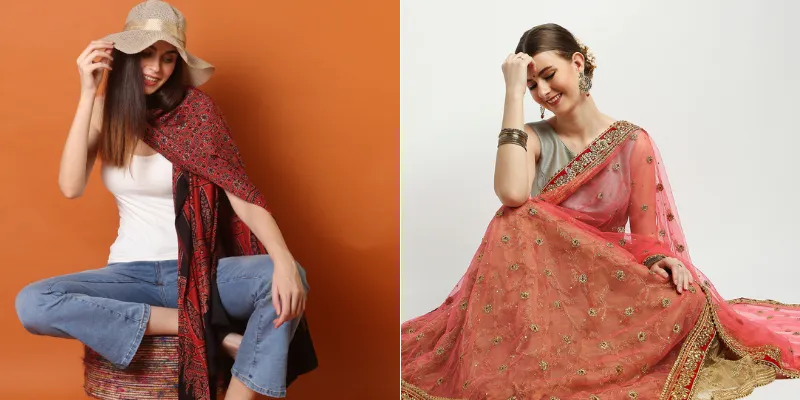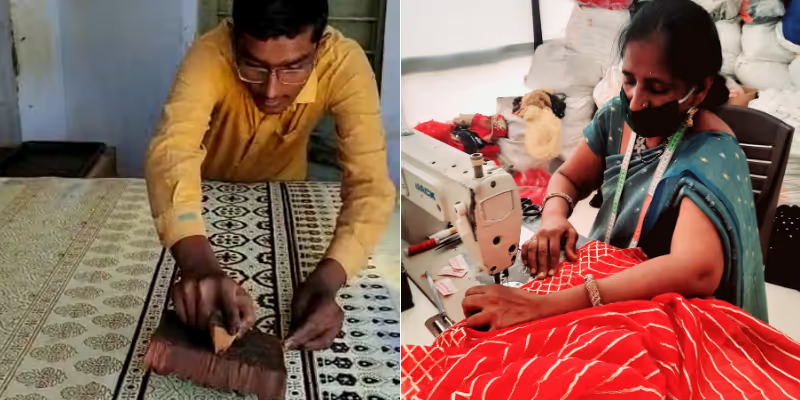This entrepreneur quit a comfortable job to sell dupattas, ended up building a multi-million brand
Gaurav Garg, a former equity research analyst started Dupatta Bazaar in 2011 in Mumbai. A decade later, he has served more than seven lakh orders worldwide. What made him quit a comfortable job to sell dupattas? SMBStory tried to find out.
The origin of dupattas (also known as chunni) goes back to Indic culture. An indigenous product that many take pride in carrying, is famous worldwide for the variety of designs.
But one biggest shortcoming with dupattas is that it usually fails to please its prime customers – women.
From quality of fabric to colour, design, and length, finding the right dupatta to match a dress is exhausting. And, this is where Dupatta Bazaar, run by Gaurav Garg, bridges the gap.
“I was once in the Crawford market of Mumbai for a meeting when I saw a woman struggling to match a dupatta with her suit. While I was waiting for the person to arrive, I could see this lady hopping from one shop to another in search of one desired dupatta but all in vain. I was in the market for about two to three hours and when I was leaving, I still found her searching for that one desired piece of dupatta,” the founder tells SMBStory.
As Gaurav hails from a family business of textiles and comes from the heart of Rajasthan, Ajmer, it was surprising for him to see that woman struggling so much. “I thought that artisans and shopkeepers dealing in dupattas in Rajasthan struggle to get customers and here customers are actually pleading for those same products.”
At this point Gaurav thought of starting a business dealing in dupattas of all kinds to help customers by creating a one-stop shop for their dupatta needs.
An ex-equity research analyst, Gaurav was the only one in his family who had pursued a job but fate had other plans. Gaurav quit his cushy job and entered the world of textile through selling dupattas.
In a span of 11 years now, Gaurav has served more than seven lakh orders and made a presence beyond the Indian boundaries. In an exclusive interaction with SMBStory, Gaurav talks about his vision and how he built a brand in a niche category.
The colourful world of dupattas
In 2011 when Gaurav came up with the idea of selling dupattas, he opened a small shop in Linking Road, Bandra. From printed, embroidered, thread work to hand printed and much more, the shop had dupattas for all tastes. He says the shop attracted a lot of customers.
“I had no guilt of leaving my job, the business was flourishing so much so that by 2015 I had opened three to four shops in Mumbai itself.” Gaurav says. Since its inception, Gaurav wanted to set up an online shop for dupattas however, he says that back then the market was not ready.

Dupatta range by Duppata Bazaar
“Flipkart was the only major ecommerce platform but the dupatta category was very niche. Customers were not open to buying online and so I rented out shops in Mumbai to start my business. But by 2013, online shopping had taken up pace after the entry of Amazon and I too then thought to take a leap and enter into the online business.”
Gaurav had invested all his savings in buying the stock. As the shops were rented, it wasn’t loss making for him to switch to online from offline. Therefore, in 2014 he started online sales by listing Dupatta Bazaar on Flipkart.
“You see, back then didn’t have a separate category for dupatta. We were one of the first ones to convince Flipkart to create a separate category of the product and people would buy it. This happened and since then we have not looked back.”
After Flipkart, Dupatta Bazaar became available in almost all ecommerce marketplaces like Snapdeal, Amazon, Limeroad, etc. In late 2015, Gaurav also started selling through the company's own website.
“After coming to the online business world I realised that not just in India, but the demand for dupattas exist worldwide. From Mexico to East Africa, Zimbawe, and wherenot, we have delivered dupattas everywhere,” Gaurav tells SMBStory.
Quality sourcing is the key
The collection of 3,000 plus dupattas available under Dupatta Bazaar are made either in-house or sourced directly from the artisans.
“We make everything in-house and believe in quality sourcing directly from the artisans from across regions in India. To date, we are supporting the families of 500-700 families of artisans,” he says.

Artisans making dupattas for Dupatta Bazaar
Price range for the dupattas ranges from lowest Rs 249 to highest around Rs 14,000.
Amid the pandemic, Dupattas Bazaar’s business did take a dip as shipments were on hold. Gaurav says that despite the slowdown in the business, he didn’t let any of his workers go.
Gaurav declined to disclose the company’s turnover but claims that he has built a multi-million business.
Major challenges and competition
One of the biggest challenges for Gaurav is the presence of unorganised players.
“For big brands like W, Aurelia, dupatta is a small category. They have already organised a segment but in the case of dupattas, many overnight sellers come and go and disturb the market.” Gaurav brings out.
When asked if customers are satisfied with the product or if online customers return the dupattas Gaurav says that high-resolution pictures with a complete description of product fabric, art, and type has helped them mitigate returns and exchanges and this is not a major challenge for the company.
Make in India for the world
“We are importing fashion from the west but here’s a product that is completely indigenous which is demanded across countries and thus, why can’t we make it for the world?” Gaurav says adding that his only vision is to be the leading manufacturer of dupattas and make it reach worldwide.
In the near future, Gaurav plans to bring in more designs and expand the reach of the brand.
Edited by Affirunisa Kankudti









